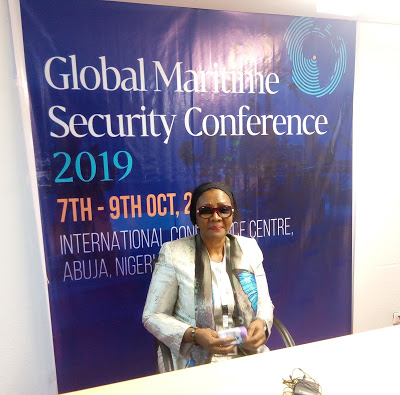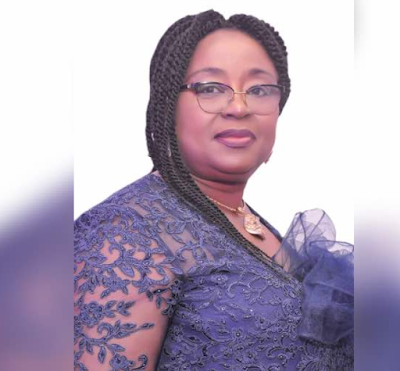Although fisheries management has been identified as crucial for economic growth of African countries, a lot of challenges including illegal, unreported, unregulated (IUU) fishing still take place persistently.
For former President of the Nigeria Trawler Owners Association (NITOA) Mrs. Margaret Orakwusi, a most significant concern in the illegalities connected with commercial fishing in Africa’s waters is the fact that there is a global market for the fishes caught in “a most irresponsible manner’’ in the region by foreign trawler owners, who do as bad as pair trawling, an act that is known for depleting the resources.
In this chat, Mrs Orakwusi is pleased that the Global Maritime Security Conference(#GMSC2019), which took place in Abuja Nigeria from Oct. 7-9, 2019, would further expose the problem to the global community, even as there were calls for proceeds of such illegal fishing to be tagged in same category as the “Blood Diamonds.”
She talks about many disturbing issues and the answers they seek, in order to protect through regulations and collaboration, the fish resources in the continent.
What are you doing to address the problems of illegal, unreported unregulated (IUU) fishing
and the issue of challenges with exporting products to foreign countries?
We have always tried to highlight the issue of IUU, because as a Nigerian, it is unacceptable to have foreigners invade our waters and poach our natural resources. When you consider the irresponsible manner in which this is done, then, it becomes very unfortunate. There are regulations in fishing. For me to effectively export products from my trawlers, my activities are highly regulated by Nigeria, by EU, by American Authorities. Before my vessel is even certified to qualify to export to Europe, EU has some regulations that I must comply with, right from my trawlers. So, what that means is that, you may own all the trawlers in the world, but only 10 will pass the test. This also includes testing my crew, apart from the fact that they will come, check each part of my vessel to ensure that my vessel is good enough to go out there and get products that their people will eat. Then, I have some hygiene regulations too. My crew has to be tested periodically. Then, the product itself, wherever I am going to fish in the deep waters, the water must be analysed and satisfied to be free from all sorts of substance. So, we do all these, showing compliance and then we export to Europe. We don’t have problem selling our products, because products from Nigeria happen to be the best all over the world, and we comply with all regulations. For my products to be sold to the EU, I have to analyse the water where the products were caught. I have to date and ensure the freezing and every other process have to undergo both in-house testing by the Nigerian Fisheries Lab, and it is certified fit. And so far, all our products have passed all in the world. I am particularly happy about that, because we are part of the history in Nigerian Fisheries lab.
My question has always been for long that these poachers come into our waters, they steal, and they fish in a very irresponsible manner sweeping from bottom to top, because they have nothing at stake in our waters, then they leave and they find markets for those products, running into billions of dollars annually. Something is not adding up very well there. And when you talk about maritime security, it is very expensive, and for piracy, you are talking about international waters. Therefore, if the pirates, poachers are winning the war out there in the sea, how do we go back and sit and know some other methods of not encouraging what they are doing, of not
allowing them sell their products? That is what we have been trying to advocate. So, where are they selling the products? Where are they finding markets for them? What banking institutions
are they using that they are not accused of money laundering or that accommodates proceeds from crime? Those of us who do it the right way, in getting your payment into your domiciliary account anywhere in the world, you have to tell a history of the fund. You have to say I caught this product from this or from that. But, why are the illegal fishing trawler getting away with it? Is it an international conspiracy? For not being able to face the poachers out there in the high sea, we should be able to force the financial institutions to be more prudent, to at least ask questions. We have the law of money laundering all over the world. We are talking in terms of billions of dollars annually, and the markets are in Europe and in Asia, and we have boldly accused them of coming into our waters and poaching our resources in a most irresponsible manner. They are stealing for this generation and for generation unborn. When you talk about fishing, things like shellfish, like lobsters, prawns and some other resources that we may not be eating here like sea cucumber, it is the hottest of cakes to the Asian countries. These are things they just come and steal and go away.
Do we lack the mechanism to check these illicit activities here?
It is about having capacity. We are talking about crime that happen out there in deep waters. So, we must build capacity to arrest them. For instance, I cannot dream of going to any of the African countries. I cannot send my trawlers there to fish without first flying their flag or being licensed by them to be able to fish there. Immediately my trawler gets there, it will be arrested. Therefore, to me, it is about building capacity. By the way, the poaching is all over Africa, it is not just in our
waters. I remember there as a time I gave a talk in Tanzania and somebody said something that was a bit scary. She said that in their own environment, some people come in there and use dynamite. It is not good. You cannot leave your safe environment and come to introduce certain things that are not safe for the environment. It is also good we keep talking until EU will hear, the UN will hear, because we need them. This is an international organised crime. Even if we can’t effectively monitor our resources, we are entitled to our resources.
What is this costing Nigeria or Africa?
It runs into billions of dollars annually. It is over 40 per cent of what comes to us.
What about the issue of kidnappings in the Niger Delta area, how is it being handled?
I think we are making progress. The trawler owners were the first to cry out to say piracy was going on in the country, and we are the most vulnerable because of the nature of our activities. When the ship lets out the outrigger to fish and a pirate vessel is coming, it takes time to hull-up, and so they easily come in. And the attacks used to be very violet. Although there have been some changes, but at the same time, the pirates are becoming too specialised. They have gone regional, and that is why this conference is very good. Working together, we may be able to see results, because a country cannot just stay and do it alone. Just the way the pirates have gone regional, the history of an incidence connects two or three countries. A vessel may be taken from country A and handed over to another pirate in country B, and may be hashed there and executed somewhere else. So, coming together to work together as a group to fight piracy, I think we will begin to see good results.


































































